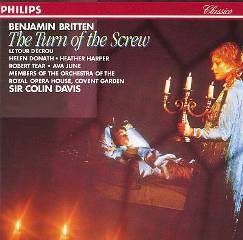Benjamin Britten - Turn of the Screw Op. 54 [2003]
Benjamin Britten - Turn of the Screw Op. 54 [2003]

CD1 1. Turn of the Screw, chamber opera, Op. 54: Act 1: The Prologue 2. Turn of the Screw, chamber opera, Op. 54: Act 1, Scene 1: Theme play 3. Turn of the Screw, chamber opera, Op. 54: Act 1, Scene 2: Variation 1 4. Turn of the Screw, chamber opera, Op. 54: Act 1, Scene 3: Variation 2 5. Turn of the Screw, chamber opera, Op. 54: Act 1, Scene 4: Variation 3 6. Turn of the Screw, chamber opera, Op. 54: Act 1, Scene 5: Variation 4 7. Turn of the Screw, chamber opera, Op. 54: Act 1, Scene 6: Variation 5 8. Turn of the Screw, chamber opera, Op. 54: Act 1, Scene 7: Variation 6 9. Turn of the Screw, chamber opera, Op. 54: Act 1, Scene 8: Variation 7 CD2 1. Turn of the Screw, chamber opera, Op. 54: Act 2, Scene 1: Variation 8 2. Turn of the Screw, chamber opera, Op. 54: Act 2, Scene 2: Variation 9 3. Turn of the Screw, chamber opera, Op. 54: Act 2, Scene 3: Variation 10 4. Turn of the Screw, chamber opera, Op. 54: Act 2, Scene 4: Variation 11 5. Turn of the Screw, chamber opera, Op. 54: Act 2, Scene 5: Variation 12 play 6. Turn of the Screw, chamber opera, Op. 54: Act 2, Scene 6: Variation 13 7. Turn of the Screw, chamber opera, Op. 54: Act 2, Scene 7: Variation 14 8. Turn of the Screw, chamber opera, Op. 54: Act 2, Scene 8: Variation 15 Philip Langridge (Prologue) Helen Donath (Governess) Heather Harper (Miss Jessel) Robert Tear (Quint) Ava June (Mrs Grose) Michael Ginn (Miles) Lillian Watson (Flora) Members of the Orchestra of the Royal Opera House, Covent Garden Colin Davis – conductor
Regarded by many as the finest of all his stage-works, The Turn of the Screw, Britten’s final chamber opera, was written in the incredibly short period of just four months in 1954. The work is based on the novel of the same name by Henry James which Britten had known for many years: a tale of good versus evil, natural versus the supernatural, possession and exorcism, set within the domestic proprieties of the Essex country house of Bly - ingredients which would have had an obvious appeal for the composer. Above all, Britten’s favourite theme of the corruption of innocence must have attracted him more than any other.
The story also lends itself to Britten’s gifts for apt and distinctive musical characterisation, the relatively ‘pure’ and uncomplicated music for the opera’s mortals contrasting strongly with the alluring, other-worldly music associated with the ghosts. The work is one of the most tautly constructed and tightly-knit of all Britten’s operas, the musical material almost wholly derived from the twelve-note ‘Screw’ theme heard near the work’s opening. However, this very concentration helps give this work its overwhelming feeling of intense claustrophobia and its astonishing dramatic power can have a shattering impact in the theatre.
Last Updated (Thursday, 08 October 2015 17:02)








